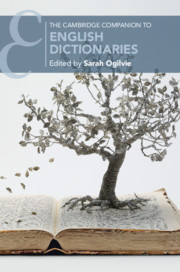Book contents
- The Cambridge Companion to English Dictionaries
- The Cambridge Companion to English Dictionaries
- Copyright page
- Dedication
- Contents
- Illustrations
- Tables
- Notes on Contributors
- Acknowledgements
- Chronology
- Chapter 1 Introduction
- Part I Issues in English Lexicography
- Part II English Dictionaries Throughout the Centuries
- Chapter 8 A Dictionary Ecosystem: Four Centuries of English Lexicography
- Seventeenth-Century English Dictionaries: Hard Words
- Eighteenth-Century English Dictionaries: Prescriptivism and Completeness
- Nineteenth-Century English Dictionaries: Descriptivism
- Twentieth and Twenty-First-Century Dictionaries
- Chapter 15 The English Period Dictionaries
- Chapter 16 English-as-a-Foreign-Language Lexicography
- Chapter 17 Electronic Dictionaries
- Chapter 18 English Dictionaries and Corpus Linguistics
- Chapter 19 Natural Language Processing in Lexicography
- Part III Dictionaries of English and Related Varieties
- Guide to Further Reading
- Index
- Cambridge Companions to Literature
Chapter 16 - English-as-a-Foreign-Language Lexicography
from Twentieth and Twenty-First-Century Dictionaries
Published online by Cambridge University Press: 18 September 2020
- The Cambridge Companion to English Dictionaries
- The Cambridge Companion to English Dictionaries
- Copyright page
- Dedication
- Contents
- Illustrations
- Tables
- Notes on Contributors
- Acknowledgements
- Chronology
- Chapter 1 Introduction
- Part I Issues in English Lexicography
- Part II English Dictionaries Throughout the Centuries
- Chapter 8 A Dictionary Ecosystem: Four Centuries of English Lexicography
- Seventeenth-Century English Dictionaries: Hard Words
- Eighteenth-Century English Dictionaries: Prescriptivism and Completeness
- Nineteenth-Century English Dictionaries: Descriptivism
- Twentieth and Twenty-First-Century Dictionaries
- Chapter 15 The English Period Dictionaries
- Chapter 16 English-as-a-Foreign-Language Lexicography
- Chapter 17 Electronic Dictionaries
- Chapter 18 English Dictionaries and Corpus Linguistics
- Chapter 19 Natural Language Processing in Lexicography
- Part III Dictionaries of English and Related Varieties
- Guide to Further Reading
- Index
- Cambridge Companions to Literature
Summary
This chapter traces the development of monolingual learners’ dictionaries (MLD) from their genesis in the 1930s through their current internet editions. Starting from the pioneering work of West, Palmer, and Hornby, it shows how the aim of enabling learners to read and write English effectively informed the developing content of MLDs, from the Oxford Advanced Learner’s through the Longman, Collins, Cambridge, Macmillan, and American Merriam-Webster dictionaries. The introduction of explicit information on grammatical and lexical patterning including collocations and idioms, the use of a limited defining vocabulary, the use of a computer corpus of texts, and the inclusion of frequency information all contributed to the profile of the MLD as it is known today. Increasing concern for accessibility has influenced both the layout of dictionary entries and the presentation of word senses in longer entries, with the use of guide words and menus. The chapter ends with a brief review of the benefits and challenges of migrating MLDs to the electronic medium, especially the Internet.
Keywords
- Type
- Chapter
- Information
- The Cambridge Companion to English Dictionaries , pp. 195 - 206Publisher: Cambridge University PressPrint publication year: 2020

